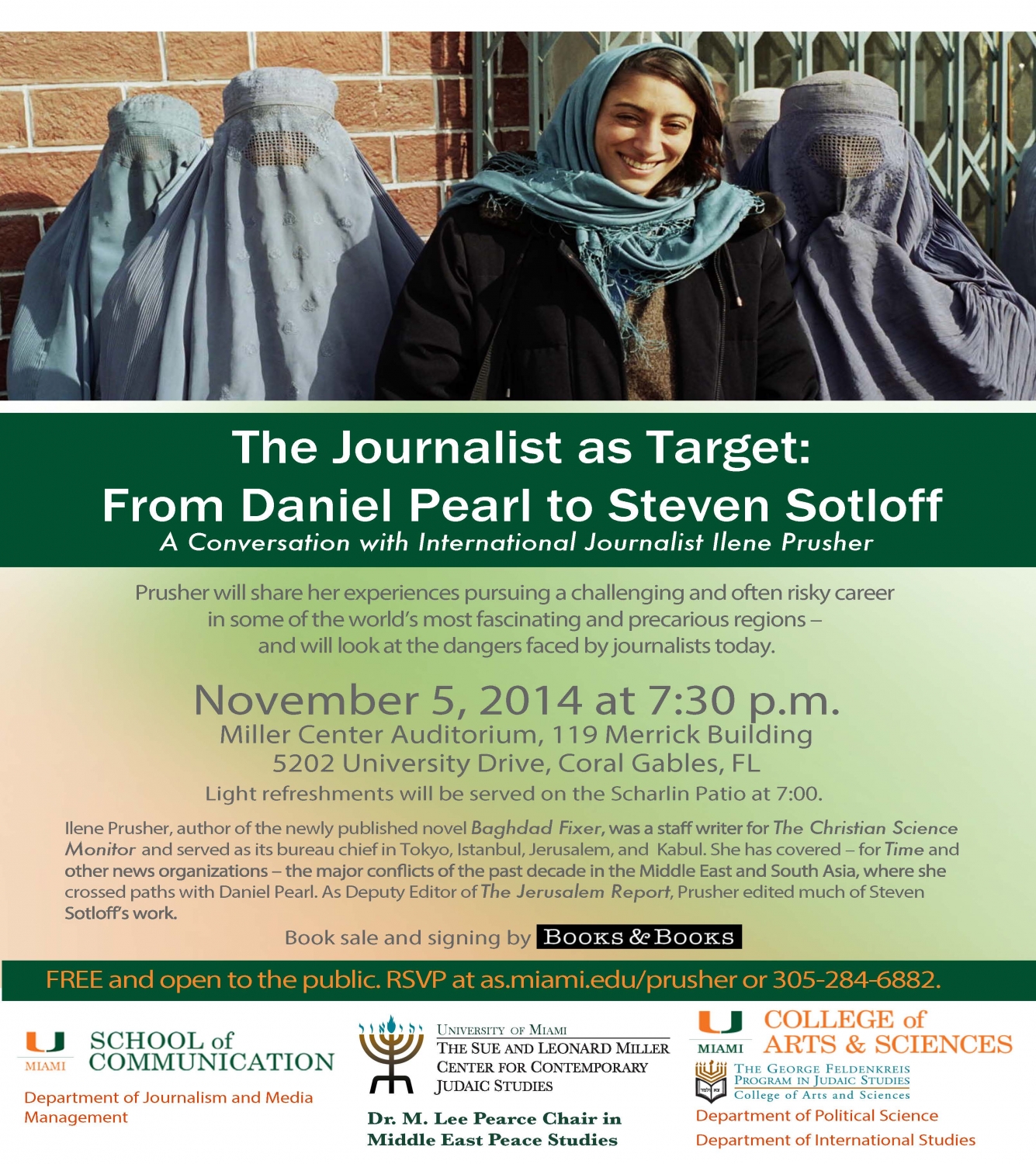Noted international journalist and editor Ilene Prusher spent nearly two decades covering wars in Iraq, Afghanistan, Pakistan and the Arab-Israeli conflicts, worked with Steven Sotloff and crossed paths with Daniel Pearl in Afghanistan.
“Journalists have stopped being collateral damage in conflicts, and now have targets painted on their backs,” Prusher said.
What makes journalists targets for violent groups and terrorists? Why have journalists become part of the story instead of just reporting on it? Prusher will describe her experiences and discuss these questions with University of Miami professors on November 5 at the UM Sue and Leonard Miller Center for Contemporary Judaic Studies.
“Journalists are going out to cover the world’s most intense conflicts because they hope to shed light on the issues,” Prusher said. “Instead they’re having their blood shed — by people who miss the fact that reporters are their best hope for sharing their message with the world.”
“Ilene Prusher’s message about the journalist as target is important as terrorism changes and evolves,” said Haim Shaked, director of the Sue and Leonard Miller Center for Contemporary Judaic Studies, the George Feldenkreis Program in Judaic Studies and professor of international studies in the UM College of Arts & Sciences. “Ilene is in a unique position, working as a journalist in the Middle East and Asia and being connected to the work of several journalists who have become victims of violence, to share her perspective and experiences with the American audience, offering insight into what today’s journalists face while doing their jobs – jobs we often take for granted.”
UM School of Communication professors Joseph B. Treaster and Rafael Lima will join Prusher to discuss a challenging and often risky career in some of the world’s most fascinating and precarious regions and look at the dangers faced by journalists today.
“Ilene Prusher knows the Middle East,” said Treaster, a professor of journalism and a former reporter and foreign correspondent for The New York Times. “She knows the forces that swept away Daniel Pearl and Steven Sotloff. And I think she can help us comprehend the darkness.”
While visting UM, Prusher will speak to School of Communication students and interact with members of UM’s student media.
“I am thrilled that Ilene will get to meet with and share her stories and experiences with our students during her UM visit,” said Professor Tsitsi D. Wakhisi, an associate professor in print practice at the School of Communication.
Prusher, who has taught journalism and writing courses at New York University-Tel Aviv and the Hebrew University, worked with a group of UM students who participated in the University of Miami-Jerusalem Press Club reporting seminar in Israel in the summer semester of 2013.
“With her masterful grasp of the region, Ilene skillfully engaged our students in tackling the myriad historical, political, cultural and religious issues that define the Middle East journalistic landscape,” said Wakhisi, one of the UM professors who helped organize the seminar and accompanied the students.
Prusher was an editor for Steven Sotloff, a South Florida journalist who was killed by the Islamic State of Iraq and the Levant (ISIS) in September of this year, and crossed paths with Daniel Pearl, who was murdered by al-Qaeda in 2002, giving her a unique, first hand insight into the dangers facing journalists today and the effects that those risks have on the job of reporting news from dangerous parts of the world. As a woman working in some areas in which women are particularly vulnerable, she also brings a one-of-a-kind perspective to the discussion.
“One of the most serious impacts of the systematic targeting of journalists in war-zones in the Middle East and South Asia,” according to Eugene Rothman, associate director of the Miller Center and a Middle East expert, “is how it can distort reporting by journalists on the ground. The recent Gaza war clearly indicated how journalists toned down or ignored stories under pressure from groups in Gaza.”
Prusher has worked for Time, The Christian Science Monitor, The Philadelphia Inquirer, The Guardian and other notable publications, and has been stationed all over the world. She was the Monitor’s bureau chief in Istanbul, Tokyo and Jerusalem and set up the newspaper’s Kabul bureau, and has covered conflicts in both Iraq and Afghanistan.
Her own experiences became the basis for her critically-acclaimed 2012 novel, Baghdad Fixer, and she was nominated by the Monitor for a Pulitzer Prize in 2005 for an investigative story on international organ trafficking. She was the recipient of a United Nations Correspondents Association (UNCA) award in 1998 for her coverage of post-war Somalia.
To attend the discussion with Ilene Prusher, RSVP online or by calling 305-284-6882. The UM Miller Center is located at 5202 University Drive, Coral Gables. The evening is free and open to the public, and will include light refreshments at 7 p.m., with the discussion starting at 7:30 p.m.
This story was originally written for UM News by Annette Gallagher







